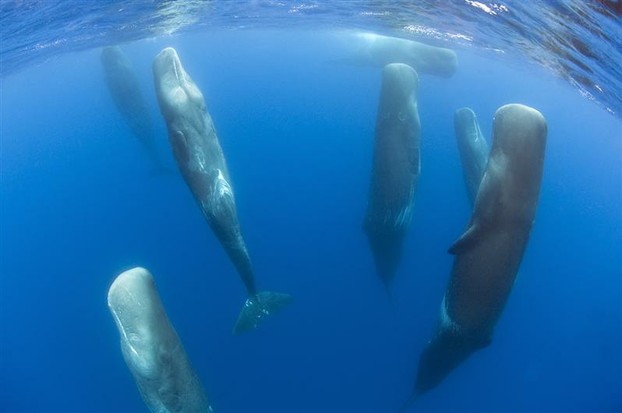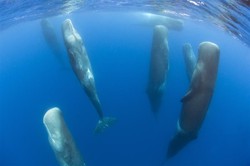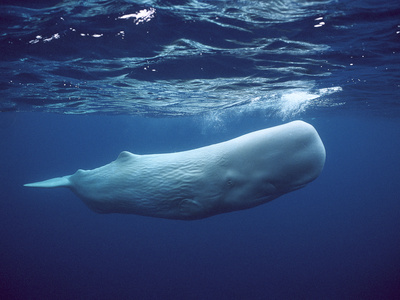On land, humans and other mammals breathe involuntarily, meaning our bodies take in air automatically. But because whales live underwater, they must be conscious breathers. They have to actively decide when to breathe, which presents a problem considering all mammalian brains must enter an unconscious state from time to time in order to function correctly.

How Do Whales Sleep?
by RunningMan
Whales don’t have gills that allow them to breathe underwater, so how do they sleep?
It’s tough to picture this phenomenon, but in 2008, scientists were finally able to capture sleeping wild whales on film. These 6 sperm whales, seen floating motionlessly and upright just below the surface of the sea, were accidentally encountered off the coast of northern Chile.
Sleeping Sperm Whales in Chile
Sperm whales’ heads are filled with a large amount of a substance called spermaceti. This milky-white waxy substance is lighter than water, causing the whales to float head-up. Other species of whales, who lack spermaceti, rest horizontally in the water (called ‘logging’).
Sperm whales can grow up to a whopping 20.5 metres (67 ft) in length and they have the largest brains of any mammal. They are found in all of the world’s oceans, from the equator to the poles. They prefer ice-free waters over 1,000 metres (3,300 ft) deep, with populations becoming more dense close to continental shelves and canyons. They’re among the deepest diving mammals and are believed to be able to reach 3 kilometres (1.9 miles) and remain submerged for 90 minutes. Between dives, sperm whale surface to breathe for about eight minutes before diving again.
 Sleeping Sperm Whales |
A Scientific First
Prior to this footage, whales and dolphins have only ever been observed shutting down one half of their brain at a time so they can keep up the necessities, like breathing and watching for predators. But these sperm whales kept both eyes shut and were 'unusually non-responsive' to the approaching boat, until it accidentally touched one of them.
Their naps lasted approximately 10 to 15 minutes, during which time they did not breathe or move. The whales appeared to sleep for just 7.1% of the time (for comparison, humans are at around 33%), most often between 6pm and midnight. Sperm whales sleep, in total, for fewer than two hours a day—less than any other wild mammal.
These observations lead scientists to believe one of two things: either a) wild whales have different sleeping habits their captive cousins, or b) sperm whales can engage in two types of sleep. Either way, scientists still have a lot to learn about how whales sleep in the wild.
You might also like
Dolphins: Our Best FriendsAll children like dolphins. Allow me to share my personal memories of my then...
The Drama of Life in the Rock PoolRock pools are amongst the most fascinating ecosystems in nature. Exploring ...




 Pacific Flyway: Bird Migration in British Columbiaon 07/11/2012
Pacific Flyway: Bird Migration in British Columbiaon 07/11/2012
 Social Media in the Workplace: Human Resources Friend or Foe?on 07/04/2012
Social Media in the Workplace: Human Resources Friend or Foe?on 07/04/2012
 7 Most Amazing Swimming Poolson 07/03/2012
7 Most Amazing Swimming Poolson 07/03/2012
 Top 5 Things to Do in Victoria BCon 06/25/2012
Top 5 Things to Do in Victoria BCon 06/25/2012


Comments
Very interesting question, one I've often wondered myself as well as how many ocean living creatures sleep. Thanks for telling us how whales sleep, fascinating! :)K